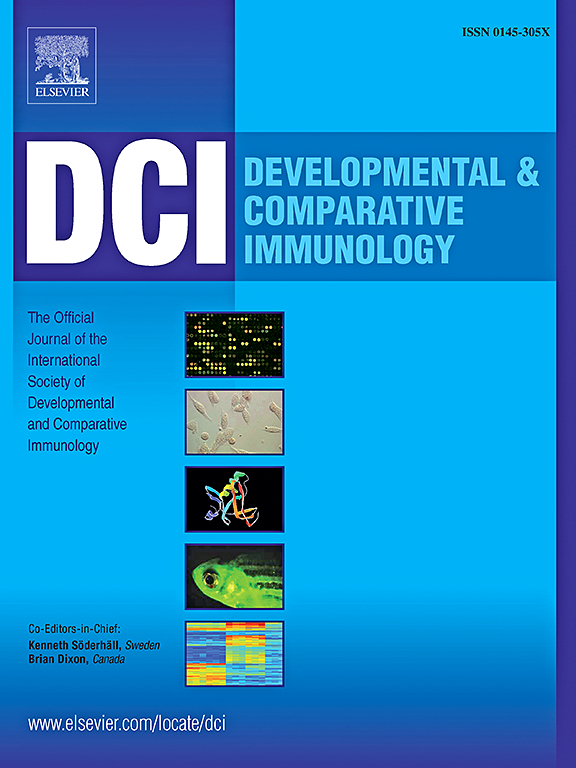Immune responses and resource allocation in Northern elephant seal pups: Effects of fasting and sexual dimorphism
IF 2.4
3区 农林科学
Q1 FISHERIES
引用次数: 0
Abstract
Mammalian parental care varies widely in investment and duration. While many species transition gradually from dependence on maternal care, others, such as the Northern elephant seal (Mirounga angustirostris), are abruptly weaned and endure prolonged fasting, relying solely on resources stored during nursing. Limited resources can lead to trade-offs between costly processes like growth and immune responses, which influence survival and fitness. Resource allocation reflects individual condition and species life-history, and may differ by sex if larger size benefits male lifetime fitness. We investigated inflammation and bacterial inhibition in Northern elephant seal pups immediately after weaning and one month into fasting, assessing whether responses were influenced by sex, growth, fatty reserves (body condition and blubber thickness), available energy (blood levels of glucose, triglycerides and total protein), nutritional stress (creatinine and δ15N), concurrent infections, and differences in maternal foraging (inferred from isotopic signals in pups’ whiskers). Newly-weaned pups had stronger immune responses than later in fasting: bactericidal ability decreased by 8.76 % (95 % CI: 5.16–12.47) and inflammation by 36.37 % (95 % CI: 16.39–53.07), as resources became depleted. Although body length and mass did not differ by sex, females maintained higher body condition (mass per unit length) throughout fasting. Newly-weaned females inhibited bacterial growth better than males, but this advantage disappeared after a month. Fatty reserves and plasma proteins were associated with immune responses later in fasting, but maternal feeding site and trophic level were not. However, endogenous resource use (measured as δ15N values) was positively correlated with bacterial inhibition. Neutrophil counts and blood iron levels explained variation in inflammation. Our study shows that innate immune responses in a rapidly growing, capital-breeding mammal depend on maternal resources and reflect early sex differences and concurrent physiological challenges. Allocation of depleting resources during fasting drives trade-offs between immune function, growth, and development.

北方象海豹幼崽的免疫反应和资源分配:禁食和两性异形的影响。
哺乳动物亲代抚育的投入和持续时间差别很大。虽然许多物种逐渐从依赖母亲照顾过渡,但其他物种,如北象海豹(miounga angustirostris),会突然断奶并忍受长时间的禁食,完全依靠哺乳期间储存的资源。有限的资源可能导致在昂贵的过程(如生长和免疫反应)之间进行权衡,这些过程会影响生存和健康。资源分配反映了个体状况和物种生活史,如果较大的体型有利于雄性的终身适应性,则资源分配可能因性别而异。我们在断奶后和禁食一个月后立即研究了北象海豹幼崽的炎症和细菌抑制,评估反应是否受到性别、生长、脂肪储备(身体状况和脂肪厚度)、可用能量(血液葡萄糖、甘油三酯和总蛋白水平)、营养应激(肌酐和δ15N)、同时感染和母海豹觅食差异(从幼崽胡须的同位素信号推断)的影响。新断奶的幼崽比禁食后的免疫反应更强:随着资源耗尽,杀菌能力下降了8.76% (95% CI: 5.16-12.47),炎症下降了36.37% (95% CI: 16.39-53.07)。虽然体长和体重没有性别差异,但雌性在禁食期间保持较高的身体状况(单位长度的体重)。新断奶的雌性比雄性更能抑制细菌的生长,但一个月后这种优势就消失了。脂肪储备和血浆蛋白与禁食后的免疫反应相关,但母体喂养部位和营养水平无关。然而,内源资源利用(以δ15N值衡量)与细菌抑制呈正相关。中性粒细胞计数和血铁水平解释了炎症的变化。我们的研究表明,在快速生长、资本繁殖的哺乳动物中,先天免疫反应依赖于母体资源,反映了早期的性别差异和同步的生理挑战。在禁食期间消耗资源的分配驱动免疫功能,生长和发育之间的权衡。
本文章由计算机程序翻译,如有差异,请以英文原文为准。
求助全文
约1分钟内获得全文
求助全文
来源期刊
CiteScore
6.20
自引率
6.90%
发文量
206
审稿时长
49 days
期刊介绍:
Developmental and Comparative Immunology (DCI) is an international journal that publishes articles describing original research in all areas of immunology, including comparative aspects of immunity and the evolution and development of the immune system. Manuscripts describing studies of immune systems in both vertebrates and invertebrates are welcome. All levels of immunological investigations are appropriate: organismal, cellular, biochemical and molecular genetics, extending to such fields as aging of the immune system, interaction between the immune and neuroendocrine system and intestinal immunity.

 求助内容:
求助内容: 应助结果提醒方式:
应助结果提醒方式:


